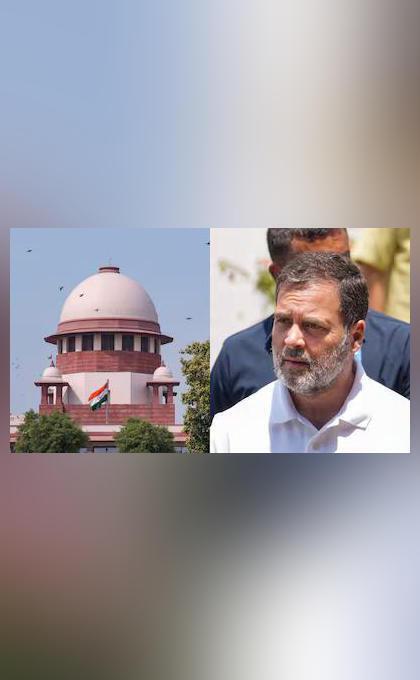
Why Ask on Social Media & Not in Parliament: SC to Rahul on ‘Land Grab’ Claim
The Supreme Court’s recent rebuke to Congress leader Rahul Gandhi has sent shockwaves across the political spectrum. In a stern warning, the apex court advised Rahul to refrain from making unsubstantiated claims on social media and instead, direct his queries to the Parliament. This came in response to Rahul’s 2020 claim that China had occupied 2,000 square kilometers of Indian land.
The SC’s sharp reprimand was delivered while staying a defamation case against Rahul for his remarks about the Indian Army. The next hearing in the case is scheduled to take place after three weeks. This development has sparked a heated debate about the role of social media in politics and the need for responsible reporting and fact-checking.
Rahul’s original claim, made during a rally in 2020, triggered a national outcry and sparked concerns about the country’s territorial integrity. The SC’s stern words, however, have raised important questions about the efficacy of social media as a platform for political discourse.
Why SC’s rebuke is significant
The Supreme Court’s rebuke is significant for several reasons. Firstly, it highlights the importance of evidence-based reporting and the need for politicians to back their claims with facts. Rahul’s claim, despite being made in a public forum, was not supported by any concrete evidence or credible sources. The SC’s words serve as a reminder that such unsubstantiated claims can have far-reaching consequences and undermine public trust in institutions.
Secondly, the SC’s rebuke underscores the need for responsible use of social media. Social media platforms have become increasingly important in shaping public opinion and influencing political discourse. However, they are also prone to misinformation and disinformation. The SC’s words serve as a warning to politicians and influencers to be cautious in their social media posts and to avoid spreading unsubstantiated rumors or claims.
Thirdly, the SC’s rebuke highlights the importance of Parliament as a platform for political discourse. The Indian Parliament is the highest law-making institution in the country, and it provides a unique opportunity for politicians to engage in constructive debate and discussion. The SC’s words serve as a reminder that politicians should utilize this platform to engage in meaningful dialogue and to avoid spreading misinformation or unsubstantiated claims.
Why Rahul’s claim was problematic
Rahul’s claim that China had occupied 2,000 square kilometers of Indian land was problematic for several reasons. Firstly, it was not supported by any credible evidence or sources. The claim was made without any concrete proof or documentation, which raised questions about its accuracy.
Secondly, the claim was made without consulting the relevant authorities or experts. The Indian government and the military have repeatedly stated that there has been no incursion or occupation of Indian land by China. Rahul’s claim, therefore, was not only unsubstantiated but also potentially damaging to the country’s international relations.
Thirdly, Rahul’s claim was made in a public forum, which makes it even more problematic. Public statements have the potential to shape public opinion and influence political discourse. Rahul’s claim, therefore, had the potential to create panic and undermine public trust in institutions.
What the SC’s rebuke means for social media
The SC’s rebuke has significant implications for social media. Firstly, it serves as a warning to politicians and influencers to be cautious in their social media posts and to avoid spreading unsubstantiated rumors or claims. Social media platforms have become increasingly important in shaping public opinion and influencing political discourse. It is essential that politicians and influencers utilize these platforms responsibly and avoid spreading misinformation or disinformation.
Secondly, the SC’s rebuke highlights the need for fact-checking and verification. Social media platforms are prone to misinformation and disinformation. The SC’s words serve as a reminder that politicians and influencers must verify the accuracy of their claims before posting them on social media.
Thirdly, the SC’s rebuke underscores the importance of transparency and accountability. Social media platforms are often used to spread misinformation or disinformation anonymously or pseudonymously. The SC’s words serve as a warning to politicians and influencers to be transparent and accountable for their online actions.
Conclusion
The Supreme Court’s rebuke to Rahul Gandhi serves as a reminder of the importance of responsible reporting and fact-checking in politics. Rahul’s claim that China had occupied 2,000 square kilometers of Indian land was problematic for several reasons, including its lack of evidence, its potential to create panic, and its potential to undermine public trust in institutions.
The SC’s words have significant implications for social media. They serve as a warning to politicians and influencers to be cautious in their social media posts, to verify the accuracy of their claims, and to be transparent and accountable for their online actions.
As we navigate the complex world of social media and politics, it is essential that we prioritize responsible reporting and fact-checking. The SC’s rebuke is a timely reminder of the importance of these values and the need for politicians and influencers to uphold them.






